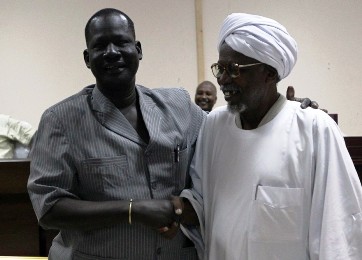Sudanese opposition leaders hold Khartoum responsible for death of Abyei chief
May 14, 2013 (JUBA) – A group of Sudanese opposition politicians visiting neighboring South Sudan have accused Khartoum of complicity in the May 5 killing of the paramount chief of the contested border region of Abyei, Kuol Deng Kuol, who was murdered by Arab nomads from the Misseriya tribe, while he was travelling in a United Nations convoy.

The group led by Kamal Omer Ahmed, secretary for political affairs with the Popular Congress Party (PCP) said that the destiny of the area will only be determined by the indigenous people and not the leadership of the two countries.
One purpose of the four man delegation’s visit is to convey their condolences on behalf of their political parties to the people of Abyei, the leadership of the ruling Sudan People’s Liberation Movement (SPLM) and the people of South Sudan in general.
Speaking to reporters shortly after meeting South Sudan’s cabinet affairs minister, Deng Alor Kuol, Ahmed said chief Kuol was not a mere tribal leader but rather positioned himself as an entryway between the two countries, especially the nine Ngok Dinka chiefdoms and the members of rival Arab nomadic community of Misseriya.
“We think that the chief, through his historic and contemporary gains, represents a dimension that is not merely tribal but rather he represents the communication between the two peoples. That’s why for us in the alliance, losing the chief is not only the concern of the people of Abyei or the family of the deceased or the government of South Sudan we think it is a concern for all of us”, Ahmed told reporters on Monday.
The opposition figure said relations between the SPLM government of South Sudan and the Sudanese opposition were “stronger than the relations with the National Congress Party (NCP)”, which the SPLM – sometimes in coalition with Sudan’s opposition – fought for over a decade and half.
The SPLM was formed in 1983 when an armed insurrection began in the South against the rule on president Jafar Niemary. The SPLM came close to signing a peace deal in 1989 with the coalition government led by the Umma Party’s of Sadig al-Mahdi but the NCP’s coup was designed to scupper the deal and the civil war continued until 2005.
South Sudan voted to secede from Sudan in 2011 after spending six uncomfortable years sharing power with the NCP.
Ahmed said that the Sudanese opposition “strongly believe that our relationship with the government and people of South Sudan is stronger the relationship they have with the National Congress Party. This is because we believe in peaceful coexistence and brotherly cooperation because we share a lot in commons besides the fact we were one before. We should indeed have been the good example to other neigbouring countries”, he explained.
Sadig Yousif, a member of a political bureau of the Sudanese Communist Party said he believes that the NCP’s leadership was behind the killing of the chief because they are in power and therefore should know where Misseriya gets their military support from.
“The Ngok Dinka people have been living peacefully together with the Misseriya for over 500 years and have never hated themselves to this level. It is the policy of the National Congress Party that is clashing these people”, Yousif explained.
Meanwhile, minister Deng Alor Kuol said he wholeheartedly welcomed the visiting delegation from the Sudanese opposition leaders and assured them of willingness of his government to facilitate their meeting with various political leaderss and groups during their stay.
Alor said he would forward their condolences to the community leadership in Abyei and to the president of the country, Salva Kiir Mayardit.
He did not say whether the group would meet the president or his vice president during their stay in the country though he accepted to help in the facilitation of their meetings.
(ST)
